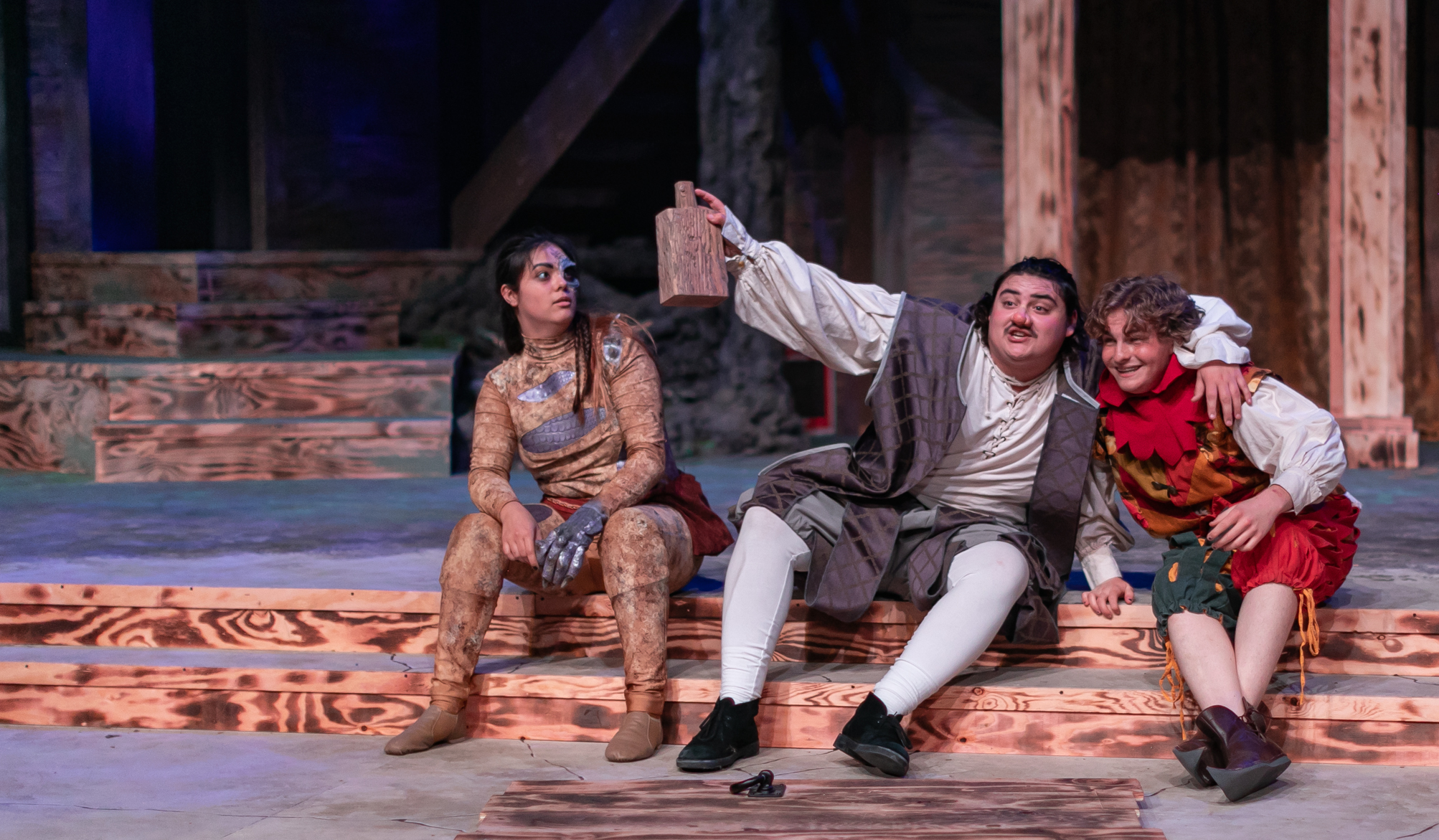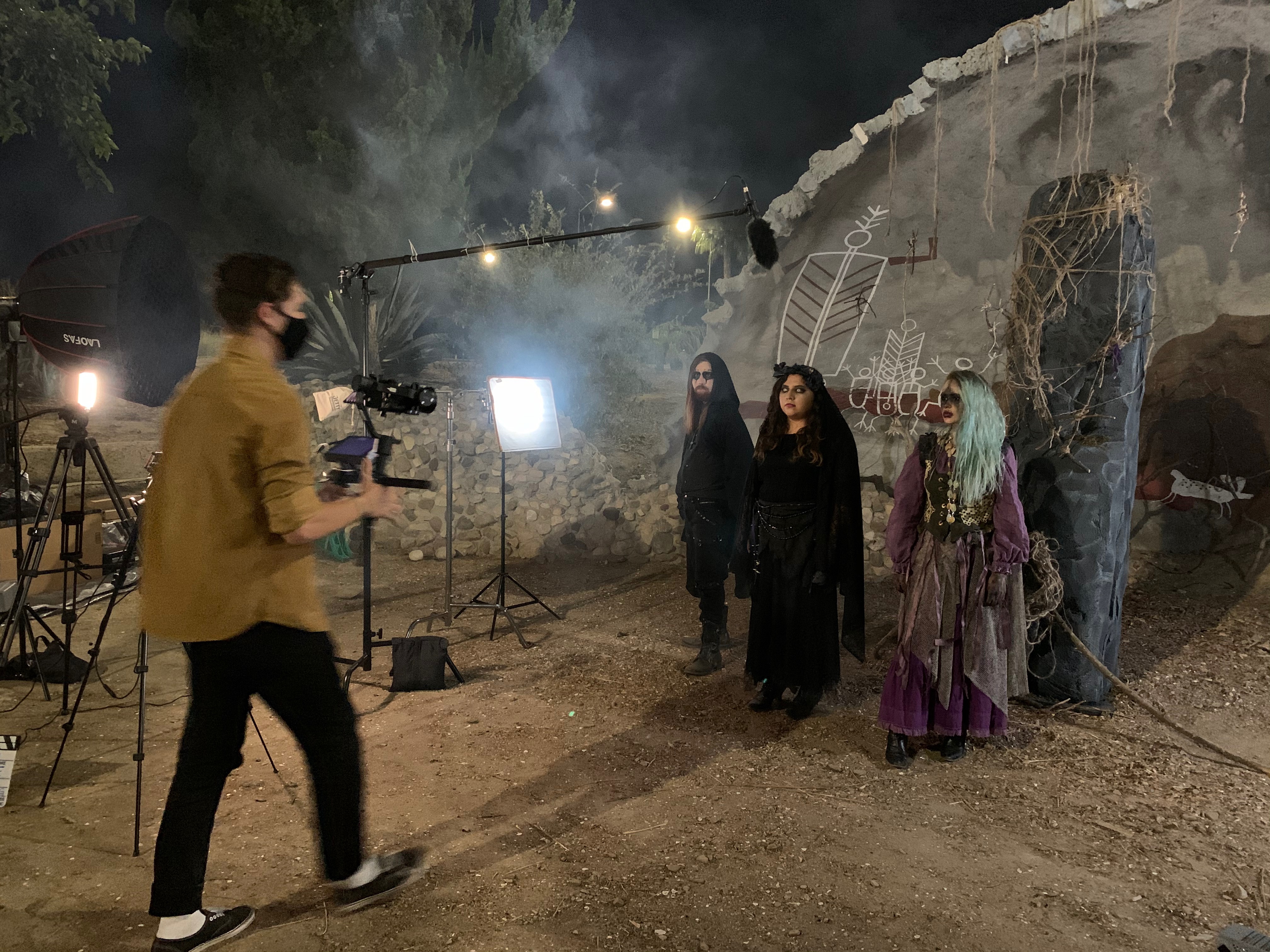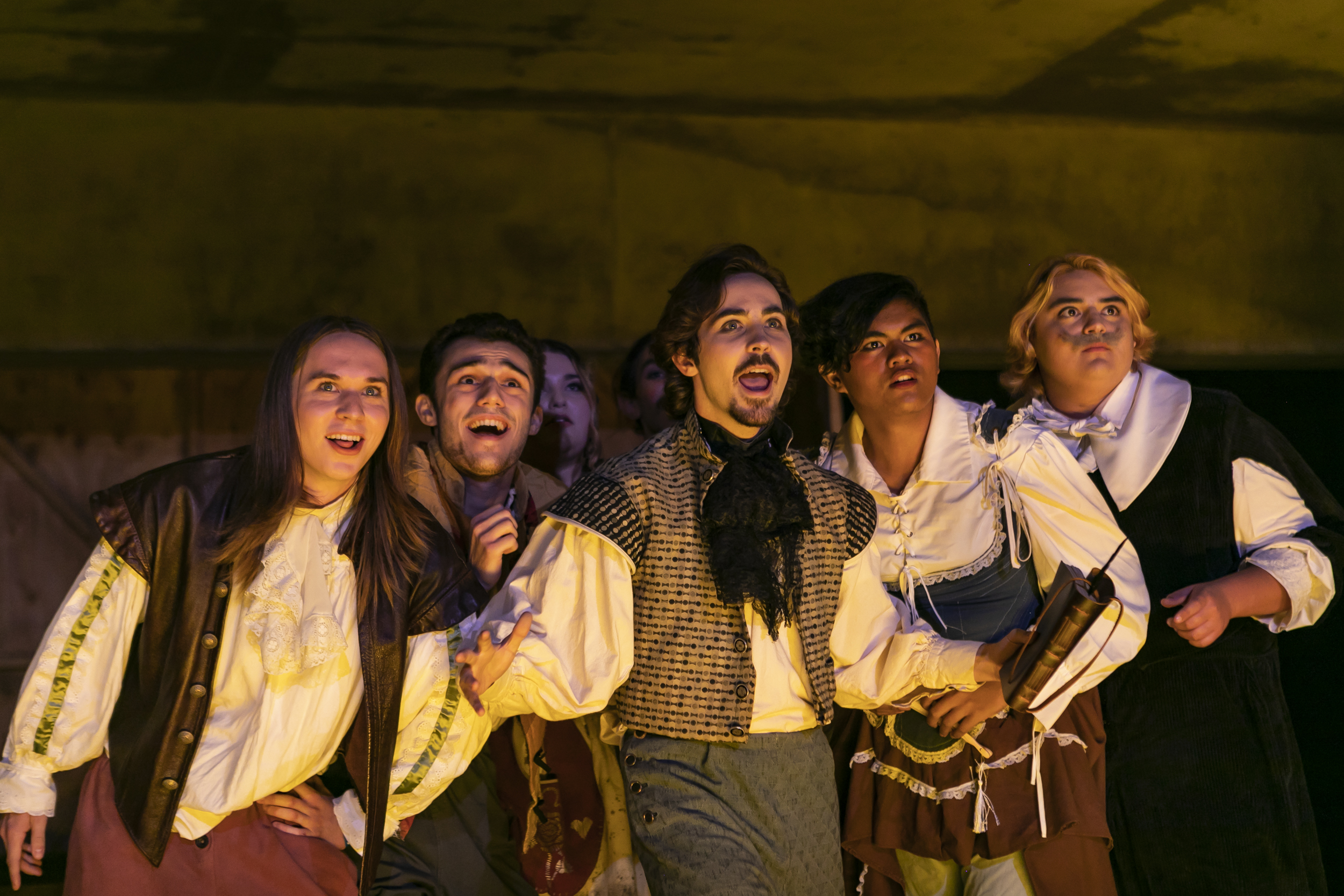Welcome to Moorpark College Theatre Arts
Auditions for the Spring 2026 Student One Acts

These Student One Acts are written, directed and acted by students.. The writing for the majority of these pieces took place in our M21A Playwrighting I and M21B Playwrighting II classes the previous semester. The pieces were produced in our Theatre Production Performance classes, M10A-D. The directors learned their craft in Directing I and Directing II M15A and M15B.
Email sfagan@vcccd.edu for more information.
- Auditions will be the 1/20, 1/21, 1/22
- The main audition days are the first two days of auditions with callbacks on the last day of auditions.
- If you are unable to make the first two days of auditions, feel free to come the last day of auditions.
- If you can't make any of the audition days but would still like to be considered, please pick a side and email a self-tape to sfagan@vcccd.edu.
- Sides (a small section of the script actors are given before an audition for either a play, film or television show) will be posted on this website closer to the dates of auditions.
- Pick a side or two that interests you and bring it to the auditions.
- There will be a sign in sheet at the auditions.
- You do not have to stay for the whole duration of the audition time but you are free to stay and watch.
- You do not have to come right when the audition starts.
- If cast, you will enroll in the production class that is 3 units.
- The show runs from Wednesday May 6th - Saturday May 9th.
- Rehearsals will begin Monday, January 26th
- Rehearsals will be MTWTH 3:30-6
- If you are a supporting character, you will not be called to all of those rehearsals but you are free to stay and watch
Let’s Circle Back
By: Wesley Umali
Director: Gabe Gutierrez
Assistant Director: Cianna Wilkins
Synopsis: The play is set in a blank room where an interview demonstrates a modern hiring process; the interviewee, a young college student desperate for a job, battles through a series of intensely strange questions with the interviewer who is revealed to be a robot by the end of the show.
Character Breakdown:
Sam: College Student desperate for a job gives a snarky strong-willed interview (Gender Neutral).
Erin: The interviewer with robotic-like facial expressions and voice; unaware of social cues (Female).
Carl: Nonchalant boss; couldn’t be bothered by interview happenings (Male).
The Lesser-Known Greek Myths or; An Ode to Hermes
By: Artimis Ott
Director: Artimis Ott
Assistant Director: Frejya Anderson
Synopsis: You've all heard the story of the great and tragic heroes like Hercules and Orpheus, now it's time you hear one of the lesser-known Greek myths. When Hermes interrupts Zeus’s retelling of the story of Hercules he is determined to make Zeus and the audience see his story telling capabilities. Of course, changing the story last minute for the actors isn’t the best idea…
Character Breakdown:
Zeus: Male, King of The Gods, an omnipotent voice who appears at the beginning and end. (Voice only role)
Hermes: Male, Messenger of The Gods, the very important but sort of forgotten child of the Olympians, looking to expand his role.
The Players (Player One, Two, and Three): M/F, the actors in Zeus's original show who play all the characters throughout the show. Players Two and Three portray both male and female characters throughout while Player One portrays the same character the whole time.
Affectionately Mine
By: Emilee Kenney
Director: Dalana Green
Assistant Director: Emilee Kenney
Synopsis: Affectionately Mine, written by Emilee Kenney, is set in the 1940s and explores the life of a young doctor (Dr. Hendrix/Lux) and the relationship he has with Aradeene, a young nurse who has worked by his side while he conducts his research. The play also explores his complicated relationship with his boss (Mr. Steiss) who tries to steal his own work and pass it off as his own.
Character Breakdown:
Dr. Hendrix (Lux): Young Male. Doctor who works at Angelwood psychiatric hospital. Has been conducting research on his patients. Has feelings for Aradeene.
Aradeene: Young Female. A kind and caring Nurse at Angelwood Psychiatric Hospital. Has been helping Dr. Hendrix in his research.
Mr. Steiss: Older Male. Boss of Dr. Hendrix. Manipulative. Steals Dr. Hendrix’s years of work and tries to present it as his own.
Dawn: Female. Nurse at Angelwood Psychiatric Hospital.
24 Hours at the Montessori Manor (Gone Wrong)
By: Carter Garcia
Director: Carter Garcia
Assistant Director: Noah Cohen
Synopsis: Two amateur ghost hunting YouTubers are determined to shoot themselves into stardom by faking a paranormal encounter inside of the notoriously haunted Montessori Manor through a series of scams and Rube Goldberg-esque schemes. Though, things quickly go downhill when they discover that they’ve awoken the very real, very angry spirit haunting the place.
Character Breakdown:
Aaron: Any gender. The obnoxious, de-facto leader of the ghost hunting crew. They’re rude, loud, and always looking for the next big scheme to make some money. The epitome of your modern-day toxic influencer.
Alex: Male. Can be played by any gender. Aaron’s best friend, and the ‘brains’ behind the whole channel. Although seemingly calmer and less aggressive than Aaron, his insults cut deeper than one would expect.
Kenny: Male. Erin’s quiet, younger cousin. He’s the team’s overworked, underpaid intern and camera man—and bound to snap at any moment.
Eveline Montessori: Female. Sharp, witty, and deceitful. Eldest daughter of the Montessori family, who’s completely fed up with the endless amount of these so-called ghost hunters infiltrating her ancestral home.
In Focus
By: Dan Lisi
Director: Faye Diaz
Assistant Director: Dan Lisi
Synopsis: A boy and his grandfather grapple with what his future will look like as high school comes to an end and the pains that come with growing up.
Character Breakdown:
Aldo: Male, 72-year-old Italian American, Vietnam War draftee, wife's dead moved back in with daughter.
Leo: 18, male, feeling lost now that graduation is coming up.
Mike: Son-in-law to Aldo. Male, early 50’s, father of Leo and Andrea, husband to Alice.
Alice: Female, mid to late 40’s, mother of Leo and Andrea, wife to Mike, and daughter of Aldo. Andrea: 7-year female, younger sister of Leo
Bananoscopy
By: Jon Pizzo Brewer
Director: Amanda Desoto
Assistant Director: Jon Pizzo Brewer
Synopsis: Brandon Smith is anxious over a pressing medical concern – he believes his banana is diseased! As he seeks out medical advice from his new doctor, Carmen Fiumicino, he tests his historical knowledge and conversational skills in an effort to get to know his new care provider. Through banter and an obliviousness to social norms, Brandon is able to explain his ailments to Carmen, who won’t let either a medical mystery or a patient’s eccentricity stop her from doing her job.
Character Breakdown:
Brandon Smith: Male; in his late twenties or thirties; a medical patient who has a
pressing concern and is not concerned with social etiquette.
Carmen Fiumicino: Female; around thirty; medical doctor (perhaps an oncologist);
someone who takes her job seriously but still has a sense of humor.
Bubbles
By: Amanda Desoto
Director: Jon Pizzo Brewer
Assistant Director: Amanda Desoto
Synopsis: Bubbles is the story of a small family experiencing a loss, with all the events of the story being viewed from the perspective of a goldfish. The play explores the themes of love and loss and the way in which these are viewed through young eyes.
Character Breakdown:
Bubbles: Ruby’s pet goldfish, presented in a serious and whimsical fashion. The perspective from which the audience will view the story, offers thoughts and insight on the events as they occur
Ruby: A little girl, bright and creative, struggling to understand the loss of her father
Coral: Ruby’s mother, kind and caring, losing her husband to cancer, searching for a way to explain this to her young daughter
Coasting By
By: Maysha Mohamedi
Director: Carly Troilo
Assistant Director: Finn Schwartz
Synopsis: Coasting By follows two teenagers who meet in private beneath a rollercoaster, scavenging dropped belongings and sharing personal stories as they hover over the edge of adulthood. As one begins to move forward into college and opportunity, the other remains stalled within the usual life they both once shared. Their casual conversations reveal shifting power, envy, hope, and the quiet fear of being left behind and facing an unknown future.
Character Breakdown:
X (15-17, any gender): A scrappy, hungry, and sharp-witted teenager who survives by scavenging beneath an amusement park ride. Tends to mask vulnerability with humor and exaggeration. It is suggested they have a fear of being left behind or unseen. X is curious, imaginative, and defensive. X represents someone who is still stuck “coasting” while wanting an escape.
W (18-20, any gender): Slightly older than X and newly launched into adulthood, W is observant, guarded, and quietly proud of having found a way forward to get to college. W is conflicted, both grateful for the opportunities they have but uncomfortable sharing success with someone who hasn’t been given the same chances. W is mostly calm with flashes of urgency and insecurity but uses it to cover a sense of guilt or discomfort about leaving X and their former life behind for upcoming academic opportunities.
Thank you all for auditioning for the student one acts.
This was an extremely difficult decision. We could have cast all these shows in a variety of ways using all of you. We thank you so much for your time. Please do not feel discouraged if you did not get a part.
Instead, please think about:
- Auditioning for the FTMA Portfolio Project next week 1/26 and 1/28 from 1-4 in MA room 129. Email clarson@vcccd.edu with any questions.
- Signing up for Improvisational Comedy which starts 2/2 and meets Tuesdays, from 7-9:15 at night. The class ends in with a performance for the friends and family. CRN 32177. Email thornor@vcccd.edu with any questions.
- Signing up for the Puppetry and Performance Class which starts 1/30 and meets Saturdays from 9am – 1:50pm. Email mmcdonald@vcccd.edu with any questions.
We would love to have all of you performing or creating with us.
Below is the cast list. If you have been cast, you must:
- Email the director to let them know if you have accepted the role.
- Attend the mandatory first day of class which is next Monday, 1/26 at 3:30pm in the black box theatre.
- Join the class THA M10 Theatre Production: Performance.
- If this is your first time signing up for the one acts your crn is: 30686
- If this is your second time signing up for the one acts your crn is: 31695
- If this is your third time signing up for the one acts your crn is 32107
- If this is your fourth time signing up for the one acts your crn is 31581
- If you are in In the Heights, you do not have to sign up for this class.
- If you cannot join due to class overlap, we will work this out on Monday.
Affectionately Mine
Director: Dalana Green dalanagreen125@gmail.com
Dr. Hendrix: Earnest 14
Aradeene – Juno 5
Mr. Steiss – Charles 4
Dawn – Carly
In Focus
Director: Faye Diaz alyssa_diaz3@my.vcccd.edu
Aldo – Daniel 22
Leo – Jo 29
Mike – Slade
Alice – Xotchil 38
Andrea – Audrey 45
Coasting By
Director: Carly Troilo troilocarly1@gmail.com
X – Mo 42
W – Thomas 46
Lesser-Known Greek Myths
Director: Artimis Ott acott1@my.vcccd.edu
Hermes – Brandon 18
Player 1- Gaten 43
Player 3 – Amy 34
Player 2 – Omar 15
Zeus (voice over) – Finn
Bananoscopy
Director: Amanda Desoto amanda_desoto1@my.vcccd.edu
Carmen – Willow 40
Brandon – Finn 17
Bubbles
Director: Jon Pizzo Brewer jonathan_brewer1@my.vcccd.edu
Bubbles – Name 11
Ruby – Cianna 2
Coral – Dalana 31
Let’s Circle Back
Director: Gabe Guttierez gagutierrez1@my.vcccd.edu
Erin – Catelin 1
Sam – Lauren 39
Carl – Emi 32
24 Hours at the Montessori Manor (Gone Wrong)
Director: Carter Garcia ollin.cg06@gmail.com
Aaron – Evelyn 28
Alex – Robin 30
Kenny – Shylah 3
Eveline – Emma Martin and Ashley 25
Auditions for Film, Television and Media Arts (FTMA) Soap Opera

The Moorpark College Theatre Arts (THA) Department encourages you to audition for the FTMA soap opera Lies in Silence. THA and FTMA have collaborated often throughout the years. Unlike In the Heights and The Student One Acts, you do not need to join a class if you are cast in Lies of Silence. If you have questions, feel free to reach out to FTMA Professor Cande Larson at clarson@vcccd.edu.



